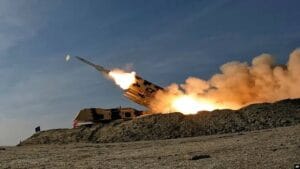US intercepts Iranian missiles in defense of Israel amid rising tensions
The Pentagon revealed that about a dozen US interceptors were launched from two Navy destroyers to counter the attack, which saw approximately 180 missiles targeting Israel.

The United States confirmed on Tuesday that it helped Israel intercepts a barrage of Iranian ballistic missiles fired at the country. The Pentagon revealed that about a dozen US interceptors were launched from two Navy destroyers to counter the attack, which saw approximately 180 missiles targeting Israel.
US President Joe Biden stated that the US “actively supported Israel’s defense” following his direct orders, spending the morning in the White House Situation Room as the crisis unfolded. “Today, at my direction, the United States military actively supported the defense of Israel, and we’re still assessing the impact,” Biden said, adding, “Based on what we know now, the attack appears to have been defeated and ineffective. And this is testament to the Israeli military capability and the US military.”

Although the Pentagon could not confirm whether the US interceptors hit any of the Iranian missiles, the Israeli military reported that most of the missiles were successfully intercepted, averting a major disaster. Major General Patrick Ryder of the Pentagon highlighted that this was one of the largest missile attacks from Iran to date, following a smaller strike in April.
Also Read:JCRC-NY condemns Iranian missile strikes, urges global support for Israel amid conflict
The Iranian attack, described as a “decisive” response by Iranian President Masoud Pezeshkian, was in retaliation for the assassination of high-profile figures, including IRGC commander Abbas Nilforoushan, Hezbollah chief Hassan Nasrallah, and Hamas leader Ismail Haniyeh. While Israel has not publicly admitted responsibility for these killings, Iran holds it accountable.
The missile strikes represent a dangerous escalation in the region, with White House National Security Adviser Jake Sullivan labeling the attack a “significant escalation.” He warned of “severe consequences” for Iran’s actions, though specifics were not provided. The situation has heightened concerns that the conflict in Gaza could spill over into a broader regional war, something the Biden administration has been trying to avoid for months.
As the situation remains fluid, both Washington and Tehran continue to exchange warnings, with the US vowing to support Israel and Iran cautioning against any direct military intervention. The growing tension is pushing the Middle East into a precarious situation, one that President Biden continues to monitor closely, indicating that further decisions regarding the US response are “in active discussion.”















